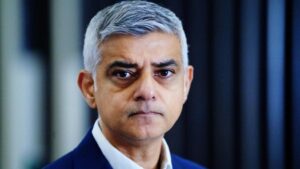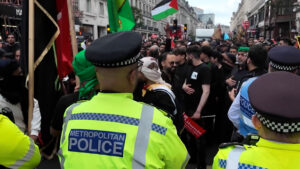INTRODUCTION
In recent years, the United Kingdom has found itself at the center of a complex and often heated debate surrounding issues of Islamophobia, racism, and free speech. As these topics increasingly intersect with politics, law enforcement, and public opinion, they reveal deep divisions within British society. This article delves into the ongoing battle over these contentious issues, exploring the implications for free speech, community safety, and social cohesion.
The Double Standard Debate: Rules for Some, Not for Others?
Across the UK, many citizens feel a growing sense of frustration over what they perceive as a double standard in how laws and societal norms are applied. This sentiment has been amplified by the influence of figures like Donald Trump, whose rhetoric often challenges established norms and highlights perceived inconsistencies in the treatment of different groups. At the heart of this debate is a fundamental question: Are the rules being enforced fairly, or are certain groups being given preferential treatment?
The issue of double standards has come into sharp focus with the UK government’s consideration of adopting an official definition of Islamophobia. This definition, which has already been accepted internally by the Labour Party, was outlined by the All-Party Parliamentary Group on Muslims. It posits that Islamophobia is rooted in racism and targets expressions of Muslimness or perceived Muslimness. Critics argue that this definition blurs the line between legitimate criticism of religious practices and outright bigotry.

Islamophobia: Racism or Religious Criticism?
There is no denying that anti-Muslim bigotry is a serious problem in the UK. Recent attacks on mosques and other acts of hatred towards Muslims underscore the need for vigilance against such prejudice. However, the question of whether Islamophobia should be categorized as a form of racism has sparked significant debate. Islam, after all, is a religion and not an ethnicity. In Western liberal democracies like the UK, the right to criticize any religion—including Islam—is protected by law.
The concern among some is that labeling criticism of Islam as “racism” could stifle free speech and create a chilling effect on open dialogue. For instance, if someone criticizes the hijab or questions the treatment of LGBTQ+ individuals within Islamic teachings, should they be branded a racist? Critics argue that such labeling could discourage legitimate discussions and impede efforts to address important social issues.
In 2019, Neil Basu, a former UK counterterrorism chief, warned that the proposed definition of Islamophobia could have serious consequences. He cautioned that it might allow terror suspects to challenge investigations on the grounds of racial discrimination, thereby hampering law enforcement efforts to combat extremism. This is a particularly troubling possibility, given the ongoing threat of Islamist terrorism in the UK and other parts of Europe.

Sadiq Khan and the Politics of Perception
The debate over Islamophobia and free speech has also drawn attention to the role of political leaders in shaping public discourse. London Mayor Sadiq Khan, himself a Muslim, has spoken out about feeling unsafe in the current climate. While his concerns are undoubtedly valid, they also raise questions about the broader implications of his leadership. For nearly a year, Khan has faced criticism for his handling of pro-Palestinian marches in London, during which many Jewish residents reported feeling intimidated and unsafe.
Critics argue that Khan has not done enough to address the concerns of Jewish Londoners, instead focusing on the safety of Muslim communities. This has led to accusations of a double standard in his approach to community safety and a perception that he is more concerned with appeasing one group at the expense of another. The rise of Islamist marches in London, which have been met with praise from the mayor despite reports of violence and intimidation, has only deepened these divisions.

The Challenge of Two-Tier Policing
One of the most contentious aspects of the current debate is the perception of two-tier policing in the UK. Many believe that law enforcement applies different standards depending on the community involved. This perception was brought into sharp relief in the West Midlands, where police were criticized for their handling of a violent incident involving a large group of masked men outside a pub in Birmingham. The fact that police consulted with community leaders before deciding on a “hands-off” approach has fueled speculation that certain groups receive preferential treatment.
The debate over two-tier policing is not just about perceived favoritism; it also touches on broader concerns about the effectiveness of law enforcement in maintaining public order. The recent migrant crisis, which has seen thousands of people arriving in the UK under Labour’s watch, has added to the sense of unease. Many Britons are frustrated by what they see as the government’s failure to address the impact of mass, uncontrolled immigration on communities, public services, and daily life.

The Erosion of Free Speech: Where Do We Draw the Line?
At the heart of these debates is a fundamental question about the nature of free speech in the UK. How do we balance the need to protect vulnerable communities from hate speech with the equally important need to safeguard the right to criticize and debate religious and political ideas? The adoption of an official definition of Islamophobia by the Labour Party and its potential implementation at the national level could have far-reaching implications for free speech in Britain.
Critics worry that such a definition could be used to silence dissent and stifle debate on important issues. For instance, would criticizing Islamic teachings or practices be considered Islamophobic under the new definition? If so, what would that mean for academic freedom, journalism, and public discourse more broadly? These are questions that need to be carefully considered as the UK navigates these complex and often contentious issues.

Conclusion: A Nation Divided
The ongoing battle over Islamophobia, racism, and free speech in the UK is a reflection of deeper divisions within society. As the country grapples with issues of identity, immigration, and community cohesion, it is essential that these debates are conducted in a way that respects both the right to free speech and the need to protect vulnerable communities from harm.
However, finding the right balance will not be easy. It requires a careful examination of the laws and policies that govern free speech, as well as a willingness to engage in open and honest dialogue about the challenges facing the nation. Only by addressing these issues head-on can the UK hope to bridge the divides that threaten to undermine its social fabric.
In the end, the question is not whether we should protect free speech, but how we can do so in a way that is fair, just, and inclusive for all. The stakes are high, and the outcome of this debate will have lasting implications for the future of democracy in Britain.
For a deeper dive into these issues, watch our video titled “Islamophobia, Racism, and Free Speech: The Ongoing Battle in the UK” on YouTube. Click here to watch.

